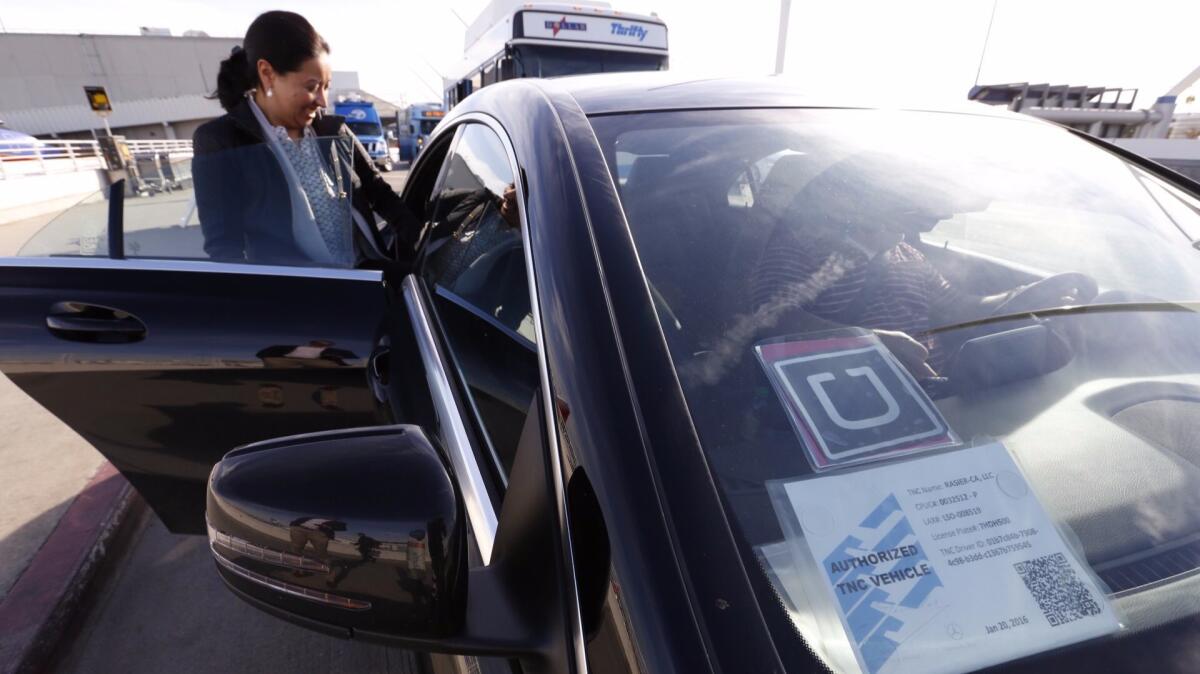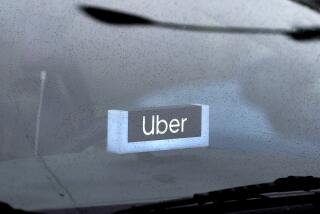Uber drivers, freelancers and other independent contractors are getting a tax cut

The new tax law delivers a massive tax cut for corporations. Republicans sold the plan in part with the argument — heavily disputed by critics — that lower business taxes would trickle down through higher wages and be a boon to the middle class.
But the law offers a more direct benefit to one seemingly growing segment of the workforce: independent contract workers.
Information technology consultants in Silicon Valley stand to benefit, as do freelance Hollywood visual effects artists. Many so-called gig workers who accept individual jobs through an app — such as Uber or Lyft drivers or TaskRabbit freelance laborers — will also see tax rates fall.
“Every Uber driver, as far as I can see, gets a benefit,” said Edward Kleinbard, a USC professor and former chief of staff to Congress’ Joint Committee on Taxation.
Whether it’s beneficial in the long run to be an independent contractor, rather than an employee, will still be hotly debated. The tax changes do nothing to address other criticism of so-called contingent work, such as its low pay, uncertain scheduling and lack of healthcare, retirement or other benefits.
But the new tax law lets “independent” workers deduct 20% of their income before paying the new, lower individual tax rates signed into law by President Trump.
That’s the same deduction received by other pass-through businesses, which, unlike corporations, pay taxes through the individual code. That category accounts for the majority of American businesses, including most independent contractors.
A single Uber driver with a net income of $40,000 a year who takes the 20% income deduction and the standard personal deduction would save $960 in federal income taxes compared with an employee with the same income, according to DeDe Jones, a certified public accountant and managing director of Innovative Financial in Colorado.
The exact number of independent contractors who stand to benefit is unknown and the law places restrictions on who can take the full deduction. For example, there are limits for taxpayers making more than $157,500 if they file individually or $315,000 as a couple.
But many contractors, especially gig workers, make less than that. And experts say some of the limits — such as what types of businesses will face stricter caps — are susceptible to evasion.
Americans, in surveys from the Bureau of Labor Statistics, report lower rates of self-employment than in previous decades. But other data show a rise in independent contracting. Lawrence Katz of Harvard University said many contractors report themselves as employees in the BLS survey. A study he did with Alan Krueger of Princeton University found 8.4% of workers in 2015 were working as independent contractors, up from 6.9% in 2005.
Internal Revenue Service data also back up the conclusion, showing a rising share of people who are independent contractors and have no W-2 income, Katz said.
Workers who get gigs through an online intermediary like Uber were only 0.5% of the workforce in 2015, the study said. But the number is growing.
TurboTax maker Intuit predicts the gig economy will almost double to 7.7 million workers in 2020, up from 3.9 million today.
TurboTax is updating its software for the new tax law, so independent contractors will know whether they qualify for the new deduction after answering a few questions.
Because much of the debate over the tax law focused on its breaks for the wealthy and lost deductions for mortgage interest and state taxes, many contractors may not even realize they’re in line for a cut.
Cecily Jamelia of Studio City was excited when told she could take advantage. The 41-year-old said that, before business deductions, she took in around $40,000 through several freelance gigs last year, including driving for Uber and video blogging under the title Drive Girl Drive, where she gives advice to female drivers.
The new tax benefit would help, she said, because Los Angeles has been saturated with people driving for Uber and Lyft.
“It’s not as easy to make money as it was before,” she said.
Whether it actually makes sense to become an independent contractor is far from certain.
Some experts have blamed the rise in such work arrangements for worsening income inequality by cutting out traditional employment benefits such as health insurance and workers’ compensation. Employers like the arrangement because they can save on those costs and more easily rid themselves of an independent contractor than they can an employee when business falls off.
“Just because there is an added incentive doesn’t really mean people will act on that incentive,” said Shu-Yi Oei, a tax professor at Boston College Law School, who has researched the gig economy.
Furthermore, not everyone can simply switch their status to become an independent contractor. The IRS and other government agencies have rules on what makes someone an employee.
Many companies — including trucking firms at the Los Angeles and Long Beach ports — have been fined for misclassifying workers as independent contractors. Authorities have alleged such businesses try to have it both ways — skimping on labor costs while retaining significant control over worker schedules.
“You still have to be in a profession where, with a straight face, you can say, ‘I am an independent contractor,’” Oei said.
For those currently in that situation, the cost-benefit analysis is simple.
“If you are already an independent contractor it’s pure good,” Kleinbard said of the tax change. “What’s not to like?”
Follow me @khouriandrew on Twitter







